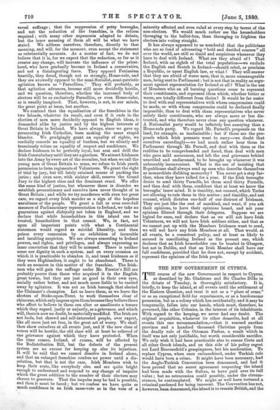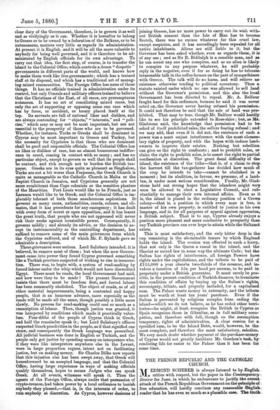Lai, NEW GOVERNMENT lN CYPRUS.
THE course of the new Government in respect to Cyprus, as described by Mr. Gladstone and Sir Charles Dilke in the debate of Tuesday, is thoroughly satisfactory. It is, briefly, to keep the island, at all events until the settlement of the Eastern Question, and treat it not as a "place of arms," or as an exceptional field-for experiments, or as a burdensome possession, but as a colony which has accidentally, and it may be temporarily, fallen into our hands, which must, therefore, be governed, like other Colonies, in the interest of its inhabitants. With regard to the keeping, we never had any doubt. The original acquisition, whatever its other demerits, had at all events this one recommendation,—that it rescued another province and a hundred thousand Christian people from the deadly rule of the Ottoman Pashas, a result which in itself was not only justifiable, but worth considerable sacrifice. We only wish it had been practicable also to rescue Crete and all other Greek islands, and on this side of his policy regret not Lord Beaconsfield's graspingness, but his moderation. To replace Cyprus, when once enfranchised, under Turkish rule would have been a crime. It might have been necessary, had the Anglo-Turkish Convention been denounced, and had it been proved that no secret agreement respecting the island had been made with the Sultan, to have paid over its full value ; but no retrocession could possibly, under the circum- stances, be contemplated. We might as well have tortured a criminal pardoned for being innocent. The Convention has not, however, been denounced, the island is-to remain British, and the clear duty of the Government, therefore, is to govern it as well and as vivifyingly as it can. Whether it is hereafter to belong to Greece or to be owned by a federation of the Balkans, or to be autonomous, matters very little as regards its administration. At present it is English, and it will be all the more valuable to anybody for being well governed, and it is therefore to be ad- ministered by English officials for its own advantage. To carry out that idea, the first step, of course, is to transfer the Wand to the Colonial Office, which controls a dozen " despotic " governments in different parts of the world, and knows how to make them work like free governments; which has a trained staff at its disposal, and which has a traditional art of manag- ing mixed communities. The Foreign Office has none of those things. It has no officials trained in administration under its control, but only Consuls and military officers trained to believe that the Christiana of the East, of all races, are presumptuous nuisances. It has no art of conciliating mixed races, but only the art of supporting or opposing some one race which has by force, or accident, or treaty placed itself at the top. Its servants are full of national likes and dislikes, and are always contending for "objects," "interests," and "poli- cies," which may or may not be most important, but are not essential to the prosperity of those who are to be governed. Whether, for instance, Turks or Greeks shall be dominant in Cyprus may be most important to Greece and Turkey, but the necessity for Cypriotes is that those who are dominant shall be good and responsible officials. The Colonial Office has no likes or dislikes of race, has an almost humourous indiffer- ence to creed, coming in contact with so many ; and has no particular object, except to govern so well that its people shall be content, and rich enough not to burden the British tax- payer. Greeks are in its eyes quite as pleasant as Singhalese, Turks are not a bit worse than Feejeeans, the Greek Church is quite as manageable as the Catholic Church in Malta or the Baptist Church in Jamaica, and Cypriotes generally are not more recalcitrant than Cape colonists or the sensitive planters of the Mauritius. Port Louis would like to be French, just as Larnaca would like to be Greek, and the Colonial Office is im- placably tolerant of both those anachronous aspirations. It governs so many races, nationalities, creeds, colours, and cli- mates, that it has precedents for any emergency ; it has dealt with every form of secret or open opposition, and it has learnt the great truth, that people who are not oppressed will never risk their necks against irresistible power. Consequently, it governs mildly ; and already its advice, or the decision to ac- cept its instrumentality as the controlling department, has sufficed to remove some of the main grievances from which the Cypriotes suffered, and of which Mr. P. Ryla.nds gave BO admirable a description.
These grievances were serious. Lord Salisbury intended, it is believed, to remove most of them ; but when the new Govern- ment came into power they found Cyprus governed something like a Turkish province suspected of wishing to rise in insurrec- tion. There was, to begin with, a system of road-making by forced labour under the whip which would not have discredited Egypt. There must be roads, the local Government had said, and how were they to be made ? The present Government insists that there must be freedom first, and forced labour has been summarily abolished. The object of roads, as of all other material improvements, being a contented and happy people, that is an immense advance, more especially as the roads will be made all the same, though possibly a little more slowly. No process for road-making could cost so much as a conscription of labour. Then, though justice was granted, it was hampered by conditions which made it practically value- less. Four-fifths of the people of Cyprus think in Greek, and half the remainder speak it ; but Lord Salisbury's officers suspected Greek proclivities in the people, as if that signified one straw, and consequently the Greek language was proscribed. All judicial business was done in English or Turkish, and the people only got justice by spending money on interpreters who, if, they were like interpreters anywhere else in the Levant, were in large proportion rogues, intent not on facilitating justice, but on making money. Sir Charles Mike now reports that this injustice also has been swept away, that Greek will henceforward be an accepted language, and that the Colonial Office, having large experience in ways of making officials qualify themselves, hopes to secure Judges who can speak Greek. At all events, witnesses will speak it. Then the agents of the Foreign Office, always undar that persuasion of crypto-treason,had taken power by a local ordinance to banish anybody they pleased,—that is, in the interests of order, to rublanybody at discretion. As Cyprus, however desirous of joining Greece, has no more power to carry out its wish with- out British consent than the Isle of Man has to become Scotch, there was no excuse whatever for this cruel law, except suspicion, and it has accordingly been repealed for all native inhabitants. Aliens are still liable to it, but the Governor has been asked whether, even as regards them, it is of any use ; and as Sir R. Biddulph is a sensible man, and as he can arrest any one who conspires, and as no alien is likely
to conspire to any purpose whatever, he will probably reply in the negative, even if for so doing he has to tolerate treasonable talk in the coffee-houses on the part of sympathisers
with Greece. The talk will do no harm, and will relieve an existence otherwise tending to political monotony. Then a statute existed under which no one was allowed to sell land without the Governor's permission, and this also the local, Government has been directed to repeal. Mr. A. Balfour fought hard for this ordinance, because he said it was never
acted on, the Governor never having refused his permission.
It could not therefore be said that the sale of land was pro- hibited. That may be true, though Mr. Balfour would hardly like to see his principle extended to Boss-shire ; but, as Ms.
Gladstone said, the knowledge that permission had to be. asked of itself prohibited sales, the sellers fearing refusal ; and we may add, that even if it did not, the existence of such a power was a most unjust interference with the most elemen- tary rights of property, and with the hopes with induce land- owners to improve their estates. Nothing but rebellion can give us the right to confiscate ; and to prohibit sales, or claim the right to prohibit sales, is to assert the right to partial confiscation at discretion. The great fiscal difficulty of the island, the existence of the tithe—that is, of a claim to stop the harvest till the tax-gatherer has decided how much of the crop he intends to take—cannot be abolished in a
moment ; but its abolition, in favour, we presume, of a land- tax, is under most serious consideration. Finally, Mr. Glad- stone held out strong hopes that the islanders might very soon be allowed to elect a Legislative Council, and sub- stantially to manage their own internal affairs. Even as it is, the island is placed in the ordinary position of a Crown colony—that is, a position in which every man is free, is master of his own property, is entitled to justice in his own
language, and is, for all purposes of appeal against oppression, a British subject. That is to say, Cyprus already enjoys a position more pleasant and more conducive to prosperity than any Turkish province can ever hope to attain while the Sultanet exists.
This is most satisfactory, and the only bitter drop in the
cup remaining is the abominable tenure by which England holds the island. The cession was effected in such a hurry, that not only is the Queen a vassal in the island, and the
Sheriat or sacred law in some way the ultimate Code; but the Sultan has rights of interference, all foreign Powers have
rights under the capitulations, and the tribute to be paid of £115,000 a year absorbs two-thirds of the revenue, and in- volves a taxation of 15s. per head per annum, to be paid in perpetuity under a British guarantee. It must surely be pos- sible, in the present condition of Turkish finances, to terminate this condition of affairs by buying up the Sultan's rights, sovereignty, tribute, and property included, for a capitalised
sum. The Palace wants money to extremity, and the tribute must be worth at least ten years' purchase. Even if the Sultan is prevented by religious scruples from ceding the island—which we do not believe, as he has ceded other terri- tories—he might, at least, recognise the British in Cyprus as Spain recognises them in Gibraltar, as in full military occu- pation, and therefore with full, though on the assumption temporary, rights of administration. A clear cession for a specified sum, to be the Island Debt, would, however, be the most complete, and therefore the most satisfactory, solution. We very much doubt whether payment of the purchase-money of Cyprus would not greatly facilitate Mr. Goschen's task, by rendering life far easier to the Palace than it has been for some time.



































 Previous page
Previous page